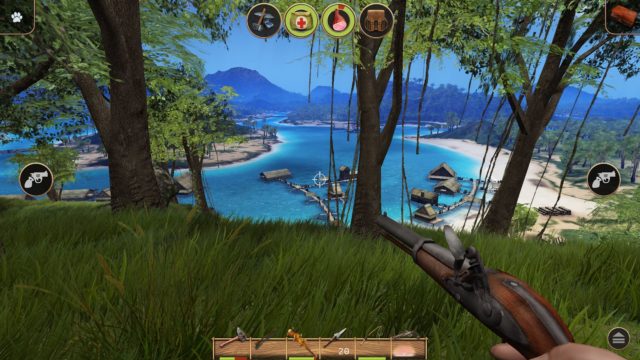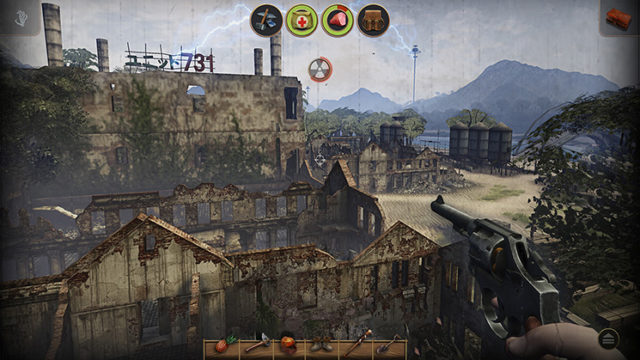Ambitious take on the survival genre; large, atmospheric world to explore; accessible selection of difficulty option.
Interface, mechanics, and some visuals hampered by adherence to mobile origins; droning soundtrack grows less tense and more tiresome over time; major issues with frame rate and crashes.
There is always something to be said for ambition. Often times, it seems like an easy enough business decision to follow a trend; it’s a potentially easy way to maximize profit with minimal creative effort. However, good developers will do their best to elevate a popular formula to create something much more unique and interesting. To its credit, Radiation Island from Atypical Games seems like an effort to accomplish this, but in the end it all comes down to the execution.
Radiation Island for Switch is a survival game with horror elements thrown in for some extra spice. Like in many survival games, you start the game on a seemingly deserted island with nothing in your possession. However, you are free to scour the land and dig through abandoned settlements to scrounge up everything and anything that might help you survive. What can’t be found can, of course, be crafted. Sticks and stones can be made into pickaxes which can be used to excavate ores which can then be smelted into stronger materials which can be made into better tools that allow you access to even better materials. Veterans of the genre are no doubt familiar with this loop, as well as familiar with the process of cutting down trees so they can gather the wood needed to build shelter, boxes, beds, and other useful items. This game is a little different in the significance it places on scrounging for guns, which are often your best hope for survival against the island’s dangers.
While the island features dangerous predators like wolves and bears, you will eventually run into the ever ubiquitous zombie as well. However, these walking dead serve as one of many hints to the intriguing story behind the world. Your character is a survivor of the Philadelphia experiment, a ludicrous, yet interesting urban legend about a US Navy experiment that allegedly teleported a ship to an unknown location. In this version of reality, you were a sailor on the ship who wound up on this mysterious island as a result of the experiment. Aside from the usual survival game clichés, you also find a series of towers zapping electricity toward an even larger structure at the center of the archipelago. The game does a good job of drawing you to these mysterious structures and instructing you on how to lower all of them so you can approach the center of the island. Journal pages found scattered around the island tell tales of experimentation and mutation and oddities around the world, such as massive ship graveyards and odd stone structures, adding even more mystery to the world. Unfortunately, once you reach the end, all the intrigue never really amounts to any big revelation or significant moment, so the journey is really more interesting than the destination.

The story and gameplay combine in an interesting way later on in the game. While you are technically free to go where you want and when you want, the game does guide you along a certain path that nicely builds up difficulty. You’ll eventually find yourself approaching towers placed inside large, derelict compounds overrun with zombies and other monstrosities. This makes preparation key as you decide whether you want to try to be stealthy in your approach, or take the time to craft loads of weapons and ammo and go in guns blazing. Thankfully, you do uncover a fast travel network across the island to make exploration a little less time consuming.
While the mysterious towers and journal entries give Radiation Island a unique atmosphere, the core mechanics are much less inspired. The game was originally designed for mobile devices and little was done to improve them in the transition to Switch. The interface still bears the markings of a mobile port, and while this still works decently while playing undocked, the home console experience is much clumsier. Furthermore, the game uses a ridiculously generous auto aim system with ranged weapons that is undoubtedly very useful when playing on phones, but makes things far too simple when playing on a device with dual analog sticks. Considering the amount of inventory management you have to do and how the frequency of combat ramps up throughout, the game would have benefited greatly from a major overhaul to its controls in the transition to Switch.
The game’s presentation also betrays its mobile roots to a certain degree. Polygon counts are low, textures are low resolution, and character models and animations are sometimes laughably simple, but now and again Radiation Island actually manages to look quite good. First of all, the world is very large, and while island layouts and structures are often repeated ad infinitum, you have to give the developers credit for aiming for such an impressive scope. The game also has a few tricks up its sleeve to impress players, such as some great lighting effects (especially around sunset) and very atmospheric fog and storm effects. The low, droning soundtrack helps build the sense of tension at times, but the fact that this type of music is pretty much the only thing on offer means that it quickly becomes tiresome throughout the majority of the game.

Based on everything above, Radiation Island is best described as a survival game with laudable ambitions that is otherwise hampered by its roots as a mobile game as well as the resources of its independent developers. Unfortunately, though, this review must go on, because this game has major issues simply running. Early on, it is unlikely you will experience any notable performance issues, but as you encounter larger encampments filled with ever increasing populations of shambling enemies, you will also experience major performance drops as the frame rate plummets ever lower. Eventually, these slowdowns will evolve into full-on crashes. While the game features a very generous auto save feature that makes picking up after a crash relatively painless, I experienced one area that nearly killed the game completely. The game slowed down to an unplayable degree before crashing and then, each time I tried to reload, it crashed again. I did discover a work around by archiving my save, deleting the game, and then reinstalling it, but I wouldn’t quite describe that as the optimal way to play any game. This process did allow me to eventually finish my adventure, but I was admittedly nervous from that point onward whenever the frame rate started to drop.
At its core, Radiation Island is a very interesting game. The mysterious tower and stories add a sense of progression and intrigue many entries in the genre lack and its ambitious scope as an open-world game with day/night cycles and ever changing weather patterns helps it stand out among more rote indie offerings. Unfortunately, while these efforts might have been laudable on mobile platforms, a simple one-to-one translation isn’t sufficient on Switch. Then again, even if the game’s interface, controls, and graphics were updated to meet these loftier expectations, it wouldn’t account for much if it were still so poorly optimized. Once again, the severity of the frame rate slowdowns is downright punishing and the frequency and severity of the crashes is inexcusable. Atypical Games obviously put a lot of effort into making Radiation Island stand out among the recent flood of survival games from indie developers and I applaud them for it, but the Switch version is a deeply disappointing port in desperate need of major patches.
Nintendojo was provided a copy of this game for review by a third party, though that does not affect our recommendation. For every review, Nintendojo uses a standard criteria.




 ShareThis
ShareThis





